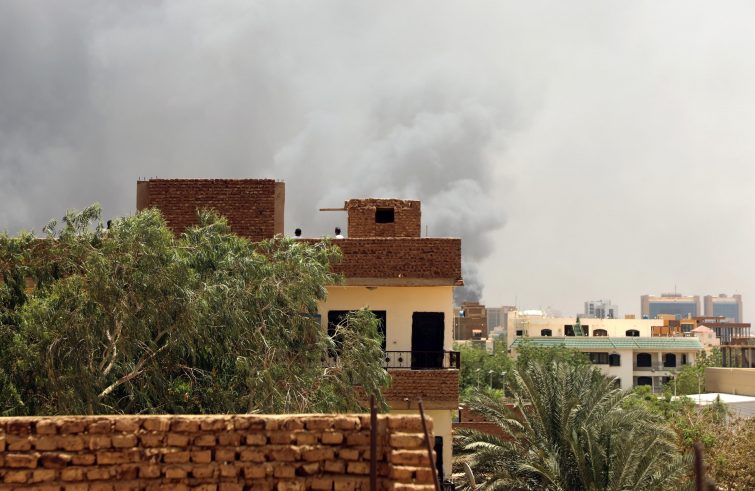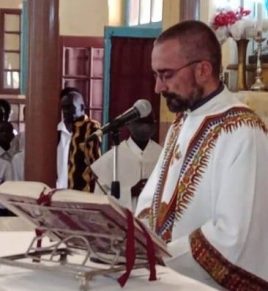
After a fairly calm yet sleepless night, the army’s “heavy artillery shelling resumed” in Khartoum this morning, the Sudanese airspace was closed, as the death toll reached almost one hundred. “It appears that the paramilitary groups have lost control of several outposts in the area surrounding the capital, while the army units loyal to General Abdel Fattah al-Burhan have recaptured their air bases.” Father Diego Dalle Carbonare, a Comboni missionary who served in the Horn of Africa country for years, currently in Egypt, gave a first-hand account with constant updates on the conflict that has been raging in Sudan since last Saturday.
 Violent race for power. Fr Dalle Carbonare, who has been in touch with his confreres in Khartoum, denounced an internal conflict between the army and paramilitary groups for the strategic control of Africa’s third largest country. The civil war that was expected already a year and a half ago, holding an entire people hostage, is being fought between the regular army loyal to General Abdel Fattah al-Burhan (head of head of Sudan’s transitional governing Sovereign Council), and RSF- Rapid Support Forces – paramilitary groups led by Mohamed Hamdan Degalo. “The population is divided between those who support the paramilitary groups, in the belief that the latter will eventually hand over the power to civilians, and those who maintain that all they want is to act in their own interests and seize control,” said Father Diego, pointing out that the paramilitary forces were originally mercenaries. At any rate, in the coming days, “we expect fighting to continue in and around the capital, with aerial bombing,” said Father Diego. “We are praying for the civilian population. Many areas were left with no electricity since Saturday, affecting drinking water and food supply.”
Violent race for power. Fr Dalle Carbonare, who has been in touch with his confreres in Khartoum, denounced an internal conflict between the army and paramilitary groups for the strategic control of Africa’s third largest country. The civil war that was expected already a year and a half ago, holding an entire people hostage, is being fought between the regular army loyal to General Abdel Fattah al-Burhan (head of head of Sudan’s transitional governing Sovereign Council), and RSF- Rapid Support Forces – paramilitary groups led by Mohamed Hamdan Degalo. “The population is divided between those who support the paramilitary groups, in the belief that the latter will eventually hand over the power to civilians, and those who maintain that all they want is to act in their own interests and seize control,” said Father Diego, pointing out that the paramilitary forces were originally mercenaries. At any rate, in the coming days, “we expect fighting to continue in and around the capital, with aerial bombing,” said Father Diego. “We are praying for the civilian population. Many areas were left with no electricity since Saturday, affecting drinking water and food supply.”
Risk of starvation. The Comboni priest pointed out that the East African region bordering Egypt to the north, Eritrea and Ethiopia to the east, is currently facing the year’s hottest season, “with maximum temperatures well above 40 degrees Celsius – exacerbating the suffering of the people who were left without food for the past two days.” Moreover, last Saturday, and until Sunday afternoon, two hundred pupils of the Comboni school (primary and secondary school run by the Comboni missionaries in Khartoum) – between the ages of six and 18 – were stuck in the basement of the building, “unable to go outside because there was gunfire all around, even in the area adjacent to the school.” Fortunately, on Sunday, came the good news: “our children managed to return to their homes, far from the city centre where the shootings were ongoing,” Father Diego explained.
A tragic outcome in the making. The missionary reassured us that his confreres are safe, at least for now, but the situation is fraught with uncertainty and changing rapidly. “We had feared this outcome for some time – he said – the clashes between the army and the paramilitary groups broke out a few days ago, but the tension was high since January 2022.” At exactly that time, between January and February 2022, the missionary told Popoli e Missione, “there were at least two or three protests a week and the military responded by blocking roads and bridges so as to block access to government buildings. It was the exacting resistance of Sudanese civil society against the military coup that ousted the legitimate premier, Abdalla Hamdok, on October 25, 2021. On October 25, 2021, the army seized Prime Minister Hamdok from his home and detained him at the residence of General Buran. They eventually arrested other ministers and attempted to form a new executive. Buran declared a state of emergency across the country while dissolving its transitional cabinet, plunging the country into utter chaos. The military had repeatedly attempted ‘secret’ negotiations with the minister held in captivity: weeks of waiting, anarchy and violence ensued nationwide. It should be noted that weapons supplied by European countries are circulating across the country. And that the destabilising situation in Sudan risks dragging in countries in the entire region. The international community has made appeals – unheeded so far – to put down their weapons, stop fighting and start negotiations for a ceasefire and for the restoration of democracy.
(*) “Popoli e Missione”












